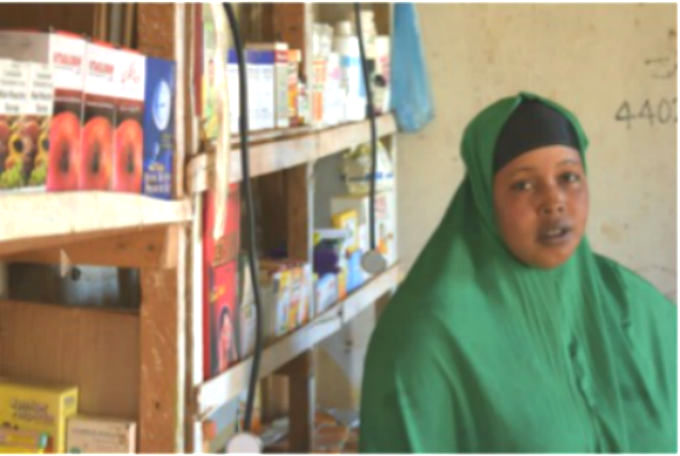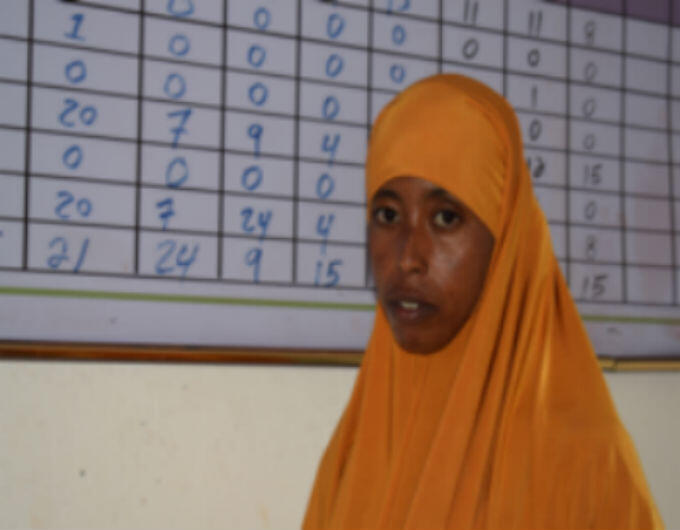Ayan looks content as she winds up her night shift at Duruqsi Mother and Child Health Center (MCH) in Somaliland. She had just referred a pregnant woman with complications to Buroa Regional Hospital. The woman is among those affected by drought, which has affected many parts of Somaliland.
“The woman started having fits while she was in labour. She was in a critical condition and could have easily died if we did not respond quickly,” said Ayan, adding: “Fortunately I am trained to handle such kind of emergencies.”
Ayan graduated in 2015 from Buroa Institute of Health Sciences (BIOHS), which receives technical and financial support from UNFPA. She is a qualified midwife and works in a Basic Emergency Newborn and Obstetric Care (BEmNOC) facility in Duruqsi District.
“I am from this area and I was specifically trained to help the people within my own community,” said Ayan, adding: “I had to return to Duruqsi upon graduation to try and make a difference to the health of mothers in my own area.”
Mona, 26, has also graduated from BIOHS and immediately returned to her home, Raydab Khaatumo, a small village 80 kilometres south of Buroa, near the Somaliland/Ethiopia border. Around 2,000 people live in this village. The people lack basic amenities including skilled medical staff. Many pregnant women do not have access to quality services by skilled birth attendants and there is a high maternal mortality rate in the area.
 Mona sometimes works all day and night to assist pregnant women
Mona sometimes works all day and night to assist pregnant women
Maternal mortality estimations show that one in 22 Somali mothers die of pregnancy related causes and the situation is exacerbated by the drought currently ravaging Somalia.
Raydab Khaatumo is situated close to many drought-affected areas and the displaced people from the surrounding rural areas have now settled in the village making the situation even worse – there are more people needing life-saving assistance, including pregnant women.
According to Mona, the lives of many women are at stake. Traditional Birth Attendants (TBAs) usually assist women in Raydab Khaatumo to deliver but fail to handle complicated cases. Many women die giving birth, if they cannot make it to Buroa Regional Hospital.
“I have therefore decided to make a difference by providing skilled midwifery attendance at birth to women giving birth. I sometimes work round the clock because there are so many women who have now moved to my area after being displaced by drought,” said Mona.
She said she sometimes has to travel to neighbouring villages affected by the drought to assist women who have failed to move and are in need of maternity care.
“I recently managed to save a woman who almost died after she gave birth at the hands of a TBA. Although she managed to deliver, the placenta remained inside her womb. I was alerted of the incident and I took a car and rushed to assist her in the middle of the night,” said Mona.
She said she was surprised to find a group women holding the mother up in anticipation that placenta will be detached. “The woman bled profusely. I asked them to stop whatever they were doing. After examination, I discovered that that she did not have adequate contractions to help remove the placenta. I augmented the contractions and she delivered the placenta safely,” said Mona.
The midwife indicated that she works under challenging conditions as she is the only qualified midwife in the area and lacks sufficient medical drugs and medical equipment.
According to the United Nations, the humanitarian situation in Somaliland and throughout Somalia is rapidly deteriorating. Out of 12.3 million Somalis, over half – 6.2 million – are now in need of humanitarian assistance, up from five million in September.
Of these nearly 3 million need urgent life-saving assistance, another drastic increase from 1.1 million six months ago. Displacement, malnutrition and drought-related diseases are all on the rise. Preliminary forecasts indicate that below average to near average rainfall is expected to prevail across most parts of Somalia during the forthcoming 2017 Gu (April-June) season.
UNFPA is responding to drought affected populations with emergency reproductive health kits including providing kits for referral facilities to manage complicated cases.
– Mohamed Yusuf
----------------------------------------------------------------------------------------------------------------------------------------
For more information please contact UNFPA Somalia Communications Specialist Pilirani Semu-Banda on e-mail: semu-banda@unfpa.org



